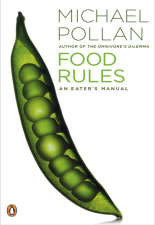Food writing is a genre of writing that focuses on food and includes works by food critics, food journalists, chefs and food historians.

Polyface Farm is a farm located in rural Swoope, Virginia, run by Joel Salatin and his family. The farm is driven using unconventional methods with the goal of "emotionally, economically and environmentally enhancing agriculture". This farm is where Salatin developed and put into practice many of his most significant agricultural methods. These include direct marketing of meats and produce to consumers, pastured-poultry, grass-fed beef and the rotation method which makes his farm more like an ecological system than conventional farming. Polyface Farm operates a farm store on-site where consumers go to pick up their products.

Gluttony means over-indulgence and over-consumption of food, drink, or wealth items, particularly as status symbols.

Tracy Jo Pollan is an American actress. She is best known for her role as Ellen Reed on the sitcom Family Ties (1985–1987).
A buffet can be either a sideboard or a system of serving meals in which food is placed in a public area where the diners serve themselves. A form of service à la française, buffets are offered at various places including hotels, restaurants, and many social events. Buffet restaurants normally offer all-you-can-eat food for a set price, but some measure prices by weight or by number of dishes. Buffets usually have some hot dishes, so the term cold buffet has been developed to describe formats lacking hot food. Hot or cold buffets usually involve dishware and utensils, but a finger buffet is an array of foods that are designed to be small and easily consumed only by hand, such as cupcakes, slices of pizza, foods on cocktail sticks, etc.
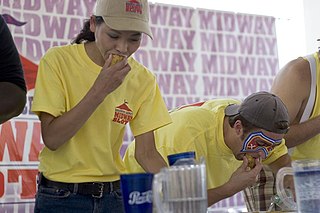
Competitive eating, or speed eating, is an activity in which participants compete against each other to eat large quantities of food, usually in a short time period. Contests are typically eight to ten minutes long, although some competitions can last up to thirty minutes, with the person consuming the most food being declared the winner. Competitive eating is most popular in the United States, Canada, and Japan, where organized professional eating contests often offer prizes, including cash.

Michael Kevin Pollan is an American author and journalist, who is currently the Knight Professor of Science and Environmental Journalism at the UC Berkeley Graduate School of Journalism.

Peter J. Menzel is an American freelance photojournalist and author, best known for his coverage of scientific and technological subjects. His work has appeared in many national and international publications including National Geographic, Forbes, Fortune, Wired, Geo, Stern, Paris Match, Life and Le Figaro. In conjunction with his wife, writer/producer Faith D'Aluisio, Menzel has also published six books including Material World: A Global Family Portrait (1994); Women in the Material World (1996); Man Eating Bugs: The Art & Science of Eating Insects (1998); Robo sapiens: Evolution of a New Species ; Hungry Planet: What The World Eats (2005). He is the founder of Peter Menzel Photography and Material World Books.

The Omnivore's Dilemma: A Natural History of Four Meals is a nonfiction book written by American author Michael Pollan published in 2006. As omnivores, humans have a variety of food choices. In the book, Pollan investigates the environmental and animal welfare effects of various food choices. He suggests that, prior to modern food preservation and transportation technologies, the dilemmas caused by these options were resolved primarily by cultural influences.
Nutritionism is a paradigm that assumes that it is the scientifically identified nutrients in foods that determine the value of individual food stuffs in the diet. In other words, it is the idea that the nutritional value of a food is the sum of all its individual nutrients, vitamins, and other components. Another aspect of the term is the implication that the only point of eating is to promote bodily health. The term is largely pejorative, implying that this way of viewing food is simplistic and harmful, and the term is usually used to label others' views. The concept's most prominent proponent, and popularizer of the term, journalist and professor of journalism Michael Pollan, argues that a food's nutritional value is "more than the sum of its parts."
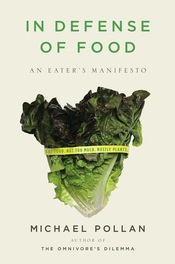
In Defense of Food: An Eater's Manifesto is a 2008 book by journalist and activist Michael Pollan. It was number one on the New York Times Non-Fiction Best Seller List for six weeks. The book grew out of Pollan's 2007 essay Unhappy Meals published in the New York Times Magazine. Pollan has also said that he wrote In Defense of Food as a response to people asking him what they should eat after having read his previous book, The Omnivore's Dilemma.
Food studies is the critical examination of food and its contexts within science, art, history, society, and other fields. It is distinctive from other food-related areas of study such as nutrition, agriculture, gastronomy, and culinary arts in that it tends to look beyond the consumption, production, and aesthetic appreciation of food and tries to illuminate food as it relates to a vast number of academic fields. It is thus a field that involves and attracts philosophers, historians, scientists, literary scholars, sociologists, art historians, anthropologists, and others.
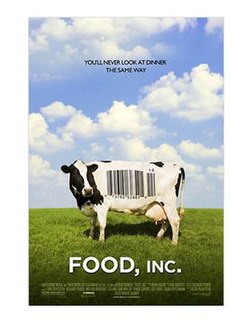
Food, Inc. is a 2008 American documentary film directed by Robert Kenner and narrated by Michael Pollan and Eric Schlosser. It examines corporate farming in the United States, concluding that agribusiness produces food that is unhealthy in a way that is environmentally harmful and abusive of both animals and employees. The film received positive reviews and was nominated for several awards, including the Academy Award for Best Documentary Feature and the Independent Spirit Award for Best Documentary Feature.

Good Calories, Bad Calories: Fats, Carbs, and the Controversial Science of Diet and Health is a 2007 book by science journalist Gary Taubes. Taubes argues that the last few decades of dietary advice promoting low-fat diets has been consistently incorrect. Taubes contends that carbohydrates, specifically refined carbohydrates like white flour, sugar, and starches, contribute to obesity, diabetes, heart disease, and other ailments. Taubes posits a causal link between carbohydrates and cancer, as well.

Carnism is a concept used in discussions of humanity's relation to other animals, defined as a prevailing ideology in which people support the use and consumption of animal products, especially meat. Carnism is presented as a dominant belief system supported by a variety of defense mechanisms and mostly unchallenged assumptions. The term carnism was coined by social psychologist and author Melanie Joy in 2001 and popularized by her book Why We Love Dogs, Eat Pigs, and Wear Cows (2009).
Samin Nosrat is an American chef, TV host, food writer and podcaster.
Cooked is a 2016 original Netflix documentary series created by Alex Gibney based on the book by Michael Pollan with the same title, starring Michael Pollan and Isaac Pollan. It explains the history and different aspects of cooking, and its ability to connect us as human beings.
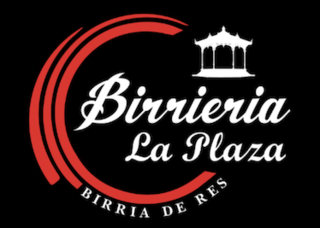
Birrieria La Plaza is a Mexican restaurant in Portland, Oregon.

Eat: An Oyster Bar is a Cajun and Louisiana Creole restaurant in Portland, Oregon.
